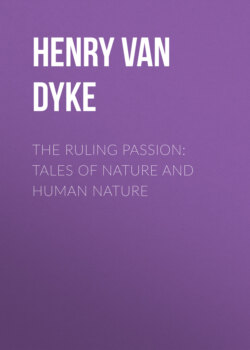Читать книгу The Ruling Passion: Tales of Nature and Human Nature - Henry Van Dyke - Страница 3
На сайте Литреса книга снята с продажи.
PREFACE
ОглавлениеTable of Contents
In every life worth writing about there is a ruling passion—“the very pulse of the machine.” Unless you touch that, you are groping around outside of reality.
Sometimes it is romantic love: Natures masterpiece of interested benevolence. In almost all lives this passion has its season of empire. Therefore, and rightly, it is the favourite theme of the storyteller. Romantic love interests almost everybody, because almost everybody knows something about it, or would like to know.
But there are other passions, no less real, which also have their place and power in human life. Some of them come earlier, and sometimes they last longer, than romantic love. They play alongside of it and are mixed up with it, now checking it, now advancing its flow and tingeing it with their own colour.
Just because love is so universal, it is often to one of the other passions that we must look for the distinctive hue, the individual quality of a life-story. Granted, if you will, that everybody must fall in love, or ought to fall in love, How will he do it? And what will he do afterwards? These are questions not without interest to one who watches the human drama as a friend. The answers depend upon those hidden and durable desires, affections, and impulses to which men and women give themselves up for rule and guidance.
Music, nature, children, honour, strife, revenge, money, pride, friendship, loyalty, duty—to these objects and others like them the secret power of personal passion often turns, and the life unconsciously follows it, as the tides in the sea follow the moon in the sky.
When circumstances cross the ruling passion, when rocks lie in the way and winds are contrary, then things happen, characters emerge, slight events are significant, mere adventures are transformed into a real plot. What care I how many “hair-breadth ‘scapes” and “moving accidents” your hero may pass through, unless I know him for a man? He is but a puppet strung on wires. His kisses are wooden and his wounds bleed sawdust. There is nothing about him to remember except his name, and perhaps a bit of dialect. Kill him or crown him—what difference does it make?
But go the other way about your work:
“Take the least man of all mankind, as I;
Look at his head and heart, find how and why
He differs from his fellows utterly,”—
and now there is something to tell, with a meaning.
If you tell it at length, it is a novel—a painting. If you tell it in brief, it is a short story—an etching. But the subject is always the same: the unseen, mysterious, ruling passion weaving the stuff of human nature into patterns wherein the soul is imaged and revealed.
To tell about some of these ruling passions, simply, clearly, and concretely, is what I want to do in this book. The characters are chosen, for the most part, among plain people, because their feelings are expressed with fewer words and greater truth, not being costumed for social effect. The scene is laid on Nature’s stage because I like to be out-of-doors, even when I am trying to think and learning to write.
“Avalon,” Princeton, July 22, 1901.
